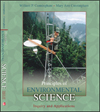 |  Principles of Environmental Science William P. Cunningham,
University of Minnesota
Mary Ann Cunningham,
Vassar College
Environmental Science and Policy
Learning ObjectivesAfter studying this chapter, you should be able to:
I.understand how adaptive and precautionary principles can help us make decisions in "wicked" problems where scientific evidence is incomplete or contradictory. |
 |  |  | II.be aware of the goals and opportunities in environmental education and environmental careers. |
 |  |  | III.summarize the cycle by which policy is established. |
 |  |  | IV.describe the path of a bill through the legislature. |
 |  |  | V.recognize the differences among civil, criminal, and administrative law. |
 |  |  | VI.judge the effectiveness of litigation in environmental issues. |
 |  |  | VII.consider the reasons that international treaties have or have not been successful. |
 |  |  | VIII.scrutinize collaborative, community-based planning methods. |
 |  |  | IX.compare radical and mainline environmental groups and the tactics they employ to bring about social change. |
|



 2002 McGraw-Hill Higher Education
2002 McGraw-Hill Higher Education